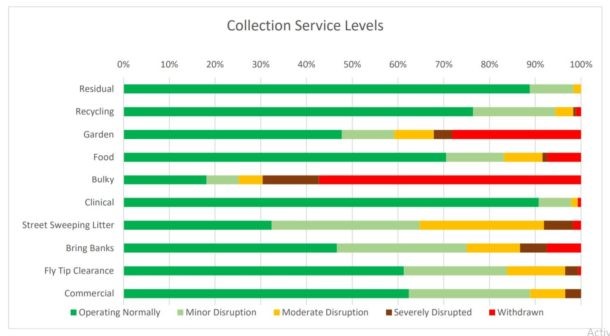The waste management collection, recycling, treatment and disposal service has been subject to unprecedented challenge and, in general, has responded with great resilience. As in any emergency situation the most crucial aspects (residual & infectious waste collection and treatment) have been prioritised and key services maintained. Furthermore, the Country (from children to HM Government) has recognised the importance of these essential services provided by Councils, Waste Management Companies and associated stakeholders.
Other important services (dry recycling collections and food waste collections) have also been maintained in the majority of cases (see graph below from the latest ADEPT survey), and the picture is improving slightly from last week – a great achievement in the light of a deteriorating picture in terms of Covid-19 infections nationally.

We have also seen collaborative platforms and information. The WISH group (a cross sectoral waste management health and safety body) has been rapid in developing guidance and information for the sector. The CIWM is hosting a platform (launching this week), supported by a range of public, charitable and private sector organisations to pool resources moving forward, in order to maintain essential services and key public and worker health and safety.
This road may however be a long one. There is the initial challenge of meeting the crisis ‘here and now’ and then the next situation of managing services, contracts and payments moving forward post lockdown and into the medium term. This period where we are outside of emergency contingency arrangements but remain within abnormal working environments, and dealing with some fallout from the emergency period. The focus is, appropriately, on the former, but consideration of the latter will be increasingly important. An example of this is in the management of HWRCs – almost all are closed at present, but there will be major operational issues dealing with the inevitable high levels of waste from households when the lockdown is over and maintaining safe working practices and social distancing in the context of an active virus. The on-going impacts from the emergency period on this service will include the loss of revenue from recyclables, the management / contract costs and contingency arrangements.
These aspects are also framed within the context of a service that was already set for significant change over the next two to three years as a result of the National Resources and Waste Strategy policies and potentially (for some contracts) Brexit impacts.
Local authorities are experiencing tensions not only in operational delivery of services (and a variety of issues occur here), but also in terms of contract discussions, HR issues, payment mechanisms and performance monitoring. There are also likely to be budget impacts of the current emergency spending actions in the medium term. Local circumstances vary widely, either as regards how the services are designed or the contractual circumstance and relationships with service delivery providers. All parties now need to consider and plan for a medium term that is affordable and strong enough to manage Covid-19, its impacts and establish a foundation for the next one to two years of service development in particular.
Where Councils are seeking support in contractual options, technical support, options review, contingency or longer term strategy and governance advice, contact us on 01746 552423 or email paul@frithrm.com . We also are providing weekly updates on our experience of the impact of Covid on clients and the sector, see here .













